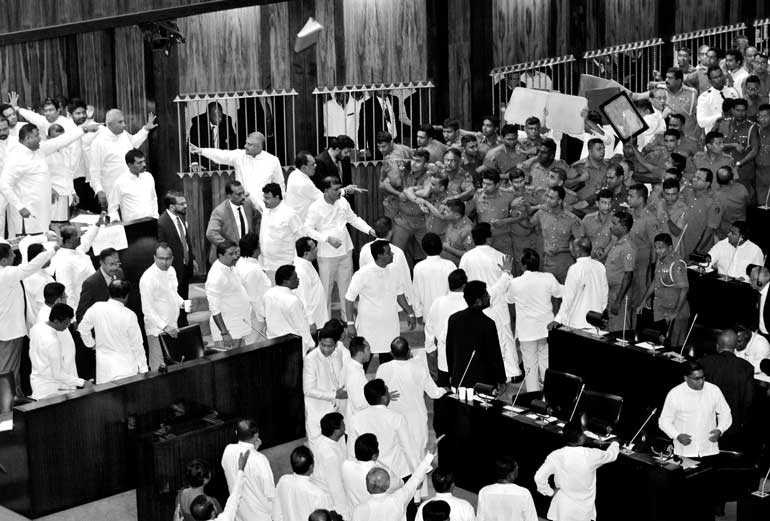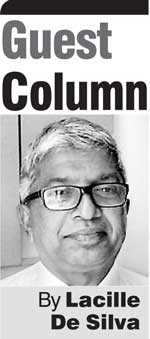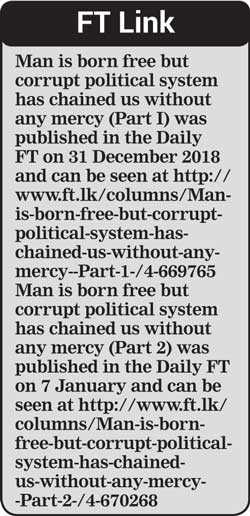Tuesday Feb 24, 2026
Tuesday Feb 24, 2026
Saturday, 12 January 2019 00:04 - - {{hitsCtrl.values.hits}}

We saw how police escorted the Speaker into the Chamber. In addition, we saw how they were behaving like animals. The MPs were in a massive brawl almost killing each other. This was a disgrace to all of us
“Democracy is not just the right to vote. It is the inalienable right to live in dignity”
“Law and order exist for the purpose of establishing justice and when they fail in this purpose they become structured dams that block the flow of social progress” – Martin Luther King Jnr.
Ever since the dawn of our human civilisation, laws had been made to protect citizens from harm and to guarantee equal protection to everyone for the greater good. The leaders of our political parties should possess fundamental values and principles to bind people together. They should be the concentrated voice to deepen common democratic foundations in the country.
Politicians should not advance only the rights and privileges for their party supporters alone at the cost of the entire population. The Organization of American States says – “The law is a set of rules for society, designed to protect basic rights and freedoms and to treat everybody fairly”. The Canadian Department of Justice had stated – “Ever since people began to live together in society laws have been necessary to hold that society together… Laws help to ensure a safe and peaceful society in which people’s right are respected.”
Thomas Hobbes, 16th century philosopher, in his famous work ‘Leviathan,’ centuries ago had pronounced that without the rule of law the existence of human beings would be “nasty, brutish and short”. It is of critical importance to strengthen rule of law and good governance to achieve sustainable development goals to guarantee freedom from want, freedom from fear, and a life of dignity, etc., for everyone.
The Constitution of the Democratic Socialist Republic of Sri Lanka clearly specifies the guidelines – the Directive Principles of State Policy (Article 27) as to how the Parliament, the President and the Cabinet of Ministers should carry out the task of the enactment of laws and the governance of Sri Lanka for the establishment of a just and free society. Constitutionally, the State is duty bound to establish a Democratic Socialist Society, the objectives of which should include the following:
Article 27 (2):
(a) the full realisation of the fundamental rights and freedoms of all persons;
(b) the promotion of the welfare of the people by securing and protecting as effectively as it may, a social order in which justice (social, economic and political) shall guide all the institutions of the national life;
(c)the realisation by all citizens of an adequate standard of living for themselves and their families, including adequate food, clothing and housing, the continuous improvement of living conditions and full enjoyment of leisure and social and cultural opportunities;
(d) the rapid development of the whole country by means of public and private economic activity and by laws prescribing such planning and controls as may be expedient for directing and co-ordinating such public and private economic activity towards social objectives and the public weal;
(e) the equitable distribution among all citizens of the material resources of the community and the social product, so as best to subserve the common good;
(f) the establishment of a just social order in which the means of production, distribution and exchange are not concentrated and centralised in the State, State agencies or in the hands of privileged few, but are dispersed among and owned by, all the people of Sri Lanka;
(g) raising the moral and cultural standards of the people and ensuring the full development of human personality; and
(h) the complete eradication of illiteracy and the assurance to all persons of the right to universal and equal access to education at all levels.
The Constitution also says: (Article27 (4)) “The state shall strengthen and broaden the democratic structure of government and the democratic rights of the people by decentralising the administration and by affording all possible opportunities to the people to participate at every level in national life and in government”. (Article 27 (7) “The State shall eliminate economic and social privilege and disparity and exploitation of man by man or by the State”. … and (Article 27 (13) The State shall promote with special care the interests of children and youth, so as to ensure their full development, physical, mental, moral, religious and social and to protect them from exploitation and discrimination.”
Our Constitution furthermore says (Article 27(14)) that the State should also protect and preserve and improve the environment for the benefit of the community. We are duty bound in terms of Article 27(15) to promote …co-operation and the establishment of a just and equitable economic and social order and should endeavour to foster respect for international law and treaty obligations in dealings among nations. Let me reproduce Article 28 as well for your information:
“(28) The exercise and enjoyment of rights and freedoms are inseparable from the performance of duties and obligations and accordingly it is the duty of every person in Sri Lanka –
(a) to uphold and defend the Constitution and the law;
(b) to further the national interest and foster national unity;
(c) to work conscientiously in his chosen occupation;
(d) to preserve and protect public property and to combat misuse and waste of public property
(e) to respect the rights and freedoms of others; and
(f) to protect nature and conserve its riches”
The framers of the 1978 Constitution had also introduced Article 29, which says – “The provisions of this chapter do not confer or impose legal rights or obligations and are not enforceable in any court or tribunal. No question of inconsistency with such provisions shall be raised in any court or tribunal.”
It is disturbing why the President, elected representatives (in all major parties SLFP, UNP, JVP and other minority parties in Parliament during the last few decades), bureaucrats, the intelligentsia and so on have totally forgotten and disregarded all salient principles shown under Article 27 in running governance and enacting laws in the country for decades. We should now urge law makers and others that they should honour the relevant principles, from now onwards at least, particularly when they attend to these onerous duties.
Dr. B.R. Ambedkar, who drafted the Indian Constitution had said – I quote, “However good a Constitution may be, if those who are implementing it are not good, it will prove to be bad. However bad a Constitution may be, if those implementing it are good, it will prove to be good.”
Ours is one of the oldest democracies in the whole world. It is the political parties that are cornerstones of any representative democracy. Political scientist had said political parties are a necessary evil in the present context. Leaders should not abuse their political positions. In our country, political parties are unregulated. We now need special legal provisions to stop “sinister combinations” to build up a well-functioning political system for the benefit of the people. We need to stop elected representatives being sold for millions and billions because politicians seek to win elections and gain power in order to manage government institutions to rob the country again and again.
Our political parties do not perform their critical functions genuinely in a multi-party system and they contest elections purely to gain power, by any means necessary. They have thereby established a ramshackle, pathetic and weighty democracy, which truly does not express the popular will of the people. The overall aim of these parties should be to create a multi-party system that is:
Furthermore, when they are out of power, they present themselves as the messiahs for alternative government and prove to gullible people undemocratically that if they are elected they would provide better solutions, constructive, ethical and necessary leadership to lead the country to achieve growth and development. After they are elected, they forget that they have been given a mandate by the voters to fulfil the pledges they made at the time of the campaign. They disregard the fact that there is an obligations to fulfil the pledges. However, they do not include anti-corruption measures, etc., in their governance activities, because both sides have robbed government funds.
We saw how police escorted the Speaker into the Chamber. In addition, we saw how they were behaving like animals. The MPs were in a massive brawl almost killing each other. This was a disgrace to all of us. Party leaders are the root cause of all these problems. They do not act responsibly. It was very well seen how both UNP Leader Ranil Wickremesinghe and former President Marhinda Rajapaksa behaved when the party-members were misbehaving in the House.
The British High Commissioner had said, I quote – “Sri Lankans have again seen deplorable behaviour by some MPs, unbecoming of them and of their noble institution.” He had added: “No parliament can perform its role when its own members stop it from doing so.”
There is a belief that countries such as Singapore, Korea became successful because they had strong authoritarian styled governance. Ours is a country where our leaders were utterly inefficient, ineffective, self-centred, dishonest, rent-seeking. They did promote cronyism. They did not promote policies such as meritocracy, incorruptibility and effective strategies.
In Singapore, Lee Kuan Yew since 1959 implemented the policy of meritocracy, which was the guiding principle of the People’s Action Party (PAP), who served for three decades. LKY had stressed that development is essentially not only economic growth, but equity, social justice and the effective exercise of human rights. The role of good government is to guide the country along a course leading to the desired goal, namely development.
Our systems have virtually collapsed. Our rulers have for the last few decades extracted everything for their personal benefit. They were unable to take advantage of our huge potential for growth. They have continually destroyed and discouraged incentives, innovations and sapped the talents of the citizens having created a hell for the citizens.
Sri Lankans have used the ballot to send many governments home since independence. We must rise up and build the nation. President Abraham Lincoln had said: “The ballot is stronger than the bullet.” Therefore, for a democracy to perform better, it is necessary to have a wise and effective leadership with a clear vision and a strong sense of commitment.
However, it is fortunate that there is an environment at present for a serious exchange of ideas. Such a contest, however, should be undertaken by serious-minded voters who are able to base their thinking on logical arguments and reason. I strongly believe we need a third force.
(This is the third and final part of this series of articles.)